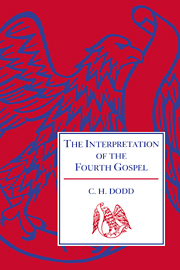Book contents
- Frontmatter
- Contents
- PART I THE BACKGROUND
- PART II LEADING IDEAS
- 1 Symbolism
- 2 Eternal life
- 3 Knowledge of God
- 4 Truth
- 5 Faith
- 6 Union with God
- 7 Light, Glory, Judgment
- 8 Spirit
- 9 Messiah
- 10 Son of Man
- 11 Son of God
- 12 Logos
- PART III ARGUMENT AND STRUCTURE
- APPENDIX: Some considerations upon the historical aspect of the Fourth Gospel
- Index Locorum
- Index Nominum
10 - Son of Man
from PART II - LEADING IDEAS
Published online by Cambridge University Press: 10 December 2009
- Frontmatter
- Contents
- PART I THE BACKGROUND
- PART II LEADING IDEAS
- 1 Symbolism
- 2 Eternal life
- 3 Knowledge of God
- 4 Truth
- 5 Faith
- 6 Union with God
- 7 Light, Glory, Judgment
- 8 Spirit
- 9 Messiah
- 10 Son of Man
- 11 Son of God
- 12 Logos
- PART III ARGUMENT AND STRUCTURE
- APPENDIX: Some considerations upon the historical aspect of the Fourth Gospel
- Index Locorum
- Index Nominum
Summary
The phrase ó γíò τō νθρώπōγ is freely used in the Fourth Gospel as a designation for Jesus, as in the Synoptic Gospels, where it occurs alike in Mark, in the material common to Matthew and Luke, and in passages peculiar to Matthew and to Luke respectively. It thus belongs to the common tradition behind the gospels, and John has undoubtedly taken it from that tradition. For him as for the other evangelists it is characteristically a self-designation of Jesus (xii. 34 is no real exception), and it is just about as frequent in the Fourth Gospel as in Mark (Mark fourteen times, John thirteen, if we follow and Sinai tic Syriac in reading τòν γíòγ τōθρώπōγ in ix. 35, against the T.R. τòγ νlòν τō θεō). The precise meaning of the term in the Synoptics is a problem in itself, to which we must not here be diverted. In the Old Testament νò νθρώōν frequently renders the Hebrew tnN*]3, in the sense of ‘human being’, e.g. Ps. viii. 5 (in parallelism with γθρωπō, tfiJN), and once the Aramaic Btopi?, Dan. vii. 13 (both LXX and Theodotion). Both these passages are cited in the New Testament as testimonia to Christ; Dan. vii. 13 in Mark xiv. 62 and parallels, and Ps. viii. 5 in Heb. ii. 6–9. The use of the latter passage, however, as a testimonium did not originate with the Auctor ad Hebraeos, since Ps. viii. 7 is cited in I Cor. xv. 27, along with Ps. cix (cx).
- Type
- Chapter
- Information
- The Interpretation of the Fourth Gospel , pp. 241 - 249Publisher: Cambridge University PressPrint publication year: 1953
- 1
- Cited by



